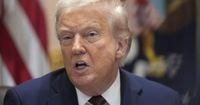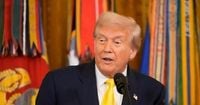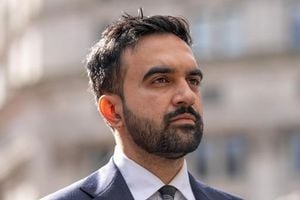President Donald Trump has ignited a fierce battle on Capitol Hill after invoking a rarely used presidential maneuver to cancel $4.9 billion in foreign aid already approved by Congress. The move, which came in a letter sent to House Speaker Mike Johnson on August 28, 2025, employs a tactic known as a "pocket rescission"—a procedural gambit that allows the president to request Congress not spend appropriated funds near the end of a fiscal year. If lawmakers cannot act on the request within a 45-day window, the funds expire unspent. The fiscal year ends on September 30, 2025, leaving Congress with precious little time to respond.
According to The New York Post, this marks the first time in nearly half a century that a president has deployed the pocket rescission. The last comparable use was in 1977, when President Jimmy Carter submitted his proposal well in advance of the 45-day deadline. Trump’s letter, published by the White House Office of Management and Budget on X, outlined that the cuts would target the State Department and the U.S. Agency for International Development (USAID)—agencies that have long been in the crosshairs of Trump’s campaign to slash foreign aid.
The funding package at stake is substantial: $3.2 billion in development grants, $520 million earmarked for the United Nations, $838 million for international peacekeeping, and $322 million set aside for democratic programs abroad. These cuts, if allowed to stand, would represent a dramatic shift in U.S. foreign policy priorities and could have far-reaching consequences for global aid initiatives.
Secretary of State Marco Rubio took to social media to confirm the administration’s intentions, declaring, “USAID is officially in close out mode.” He went on to commend White House budget director Russ Vought for overseeing the agency’s shutdown, stating, “Russ is now at the helm to oversee the closeout of an agency that long ago went off the rails.” This public acknowledgment underscored the administration’s determination to see the cuts through, regardless of mounting criticism.
The backlash from both sides of the political aisle was swift and pointed. Senator Susan Collins, a Republican from Maine, issued a sharp rebuke, arguing that the Constitution “makes clear that Congress has the responsibility for the power of the purse” and warning that clawing back funds “without congressional approval is a clear violation of the law.” She added, “Instead of this attempt to undermine the law, the appropriate way is to identify ways to reduce excessive spending through the bipartisan, annual appropriations process.” Her comments, reported by AP, reflected growing concern among lawmakers that Trump’s maneuver could set a dangerous precedent.
Senate Democratic Leader Chuck Schumer was equally alarmed, warning that the move could destabilize the budget process and even trigger “a painful and entirely unnecessary shutdown.” Schumer accused the administration of attempting an “unlawful gambit to circumvent the Congress all together,” cautioning that any budget agreements reached in the Senate could lack authority if the White House has the power to withhold spending at will. “But if Republicans are insistent on going it alone, Democrats won’t be party to their destruction,” Schumer stated, as quoted by Tucson.com.
Legal scholars have also weighed in, casting doubt on the legality of the maneuver. Georgetown University law professor Eloise Pasachoff, an expert on federal spending issues, has written that the Impoundment Control Act of 1974 requires Congress to act within 45 days for a rescission to take effect. “This mandatory language admits no exceptions, indicating that Congress expects the funds to be used as intended before the end of the fiscal year if it does not approve the proposed rescission,” Pasachoff wrote in an academic paper last year. Her analysis, cited in multiple outlets, suggests that the White House alone cannot decide to withhold funds without explicit congressional approval.
A senior White House official, speaking anonymously to reporters and cited by AP, declined to specify how far Trump might go in using pocket rescissions in the future but insisted that the administration was confident the strategy would hold up in court. The official described the goal as making “the cleanest case possible for these types of clawbacks.” This confidence, however, has done little to assuage critics who see the move as part of a broader campaign by Trump to expand presidential authority at the expense of Congress and federal agencies.
Indeed, Trump’s administration has already demonstrated a willingness to test the boundaries of executive power. In recent years, the White House has imposed sweeping tariffs without congressional approval, fired large numbers of federal workers, and sought to limit the independence of institutions such as the Federal Reserve and the Centers for Disease Control and Prevention. Earlier in 2025, the administration announced plans to eliminate nearly all USAID contracts and to wipe out $60 billion in overseas assistance, further consolidating control over foreign aid within the State Department.
The implications of Trump’s latest move are significant. If the White House standardizes the use of pocket rescissions, future presidents could effectively bypass Congress on key spending decisions, potentially throwing the government’s budget process into disarray. As Tucson.com reported, such a shift could undermine the normal funding process and increase the risk of government shutdowns, particularly as the fiscal year draws to a close.
For supporters of the president’s agenda, the pocket rescission represents a bold effort to rein in what they view as excessive and ineffective foreign spending. They argue that deep cuts to foreign aid are a necessary step toward fiscal responsibility and a reassertion of American priorities. Detractors, however, warn that such reductions offer little in the way of deficit relief and risk undermining U.S. influence abroad, particularly in areas such as international development, peacekeeping, and the promotion of democratic values.
The debate over the legality and wisdom of the pocket rescission is likely to continue in the coming weeks, especially as the September 30 deadline approaches. The Trump administration initially asked the Supreme Court to block rulings that had preserved some aid programs, including those for global health and HIV/AIDS, but withdrew the appeal on August 30, 2025, following a favorable ruling from a lower court. This legal back-and-forth underscores the uncertainty surrounding the administration’s strategy and the broader struggle over the separation of powers in Washington.
As Congress scrambles to respond and the courts weigh in, the fate of billions in foreign aid—and the future of executive power in America—hangs in the balance. The White House’s willingness to test the limits of the law may have set the stage for a constitutional showdown, one that could reshape the contours of American governance for years to come.






